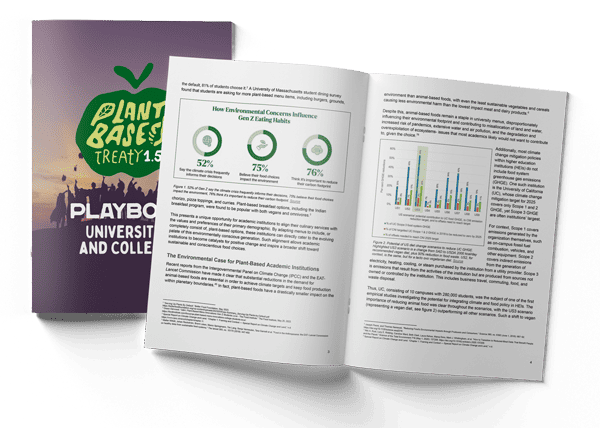Blog
Veganuary & Earth Month University Pledge Campaign
Veganuary is underway, and people around the world are swapping out meat, dairy, fish, and eggs for healthier and kinder alternatives. This non-profit organization inspires people to try vegan for January and beyond. Since 2014, millions of people have signed up to eat healthier, save animals, and help stop the destruction of our earth from animal agriculture. Veganuary’s 5-Year Strategy aims to move towards a world where veganism is the norm, not the exception.
For Veganuary, The Plant Based Treaty is encouraging University Chefs to consider switching to a vegan menu or adding new plant-based options in response to the climate and planetary crises. This important initiative includes making plant-based milk the default and suggests simple ingredient swaps that will not affect quality, taste, or cost. Helping Chefs boost vegan options lowers animal agriculture’s environmental impact on our planet. When Veganuary ends, Universities can continue campaigns leading up to April for Earth Month.
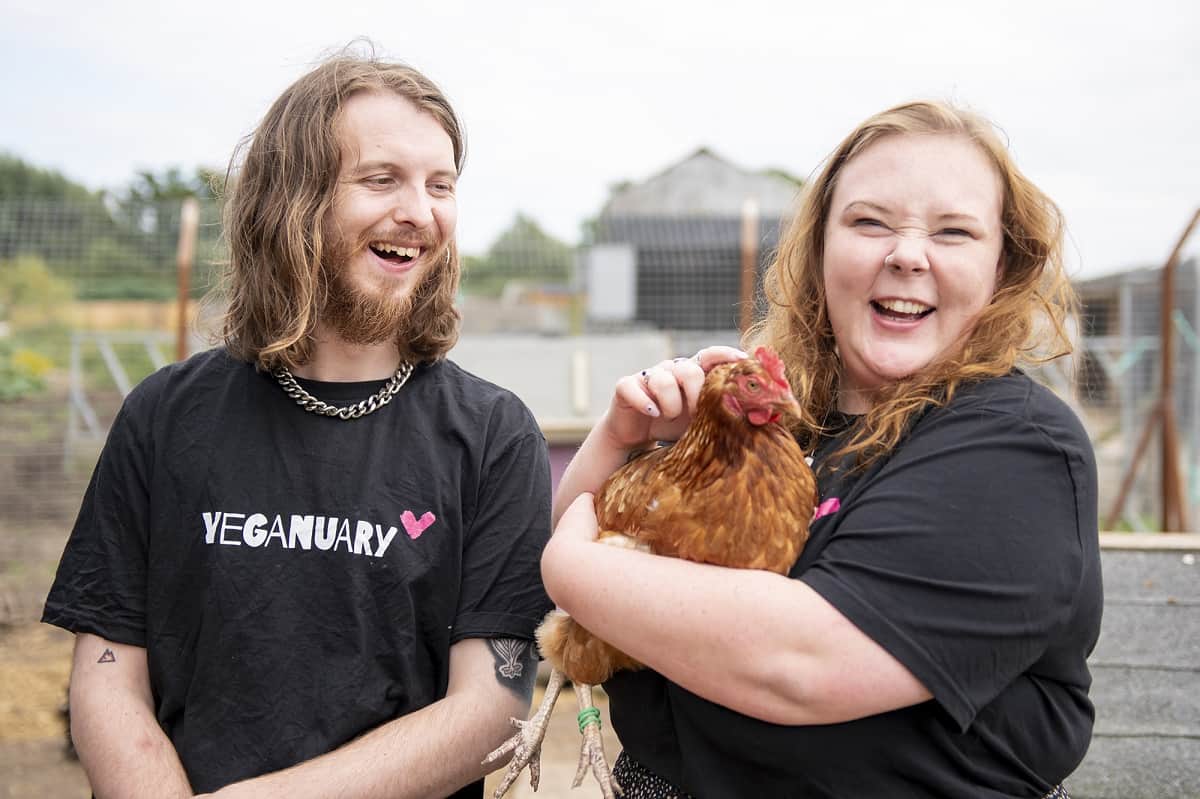
Image credit: Veganuary

Plant Based Universities:
Plant Based Universities is a student-led initiative with active campaigns in over 70 universities run by students on campus. This number should grow to 100 campaigns by the end of the school year. Student campaigns are crucial because universities have significant influence over the broader ethical views in communities and worldwide that can lead to positive environmental change. Nine universities in the UK and abroad have committed to fully vegan menus, including the University of Cambridge and Stirling. It’s common to start plant-based menu transitions 50% at a time and increase until fully vegan.
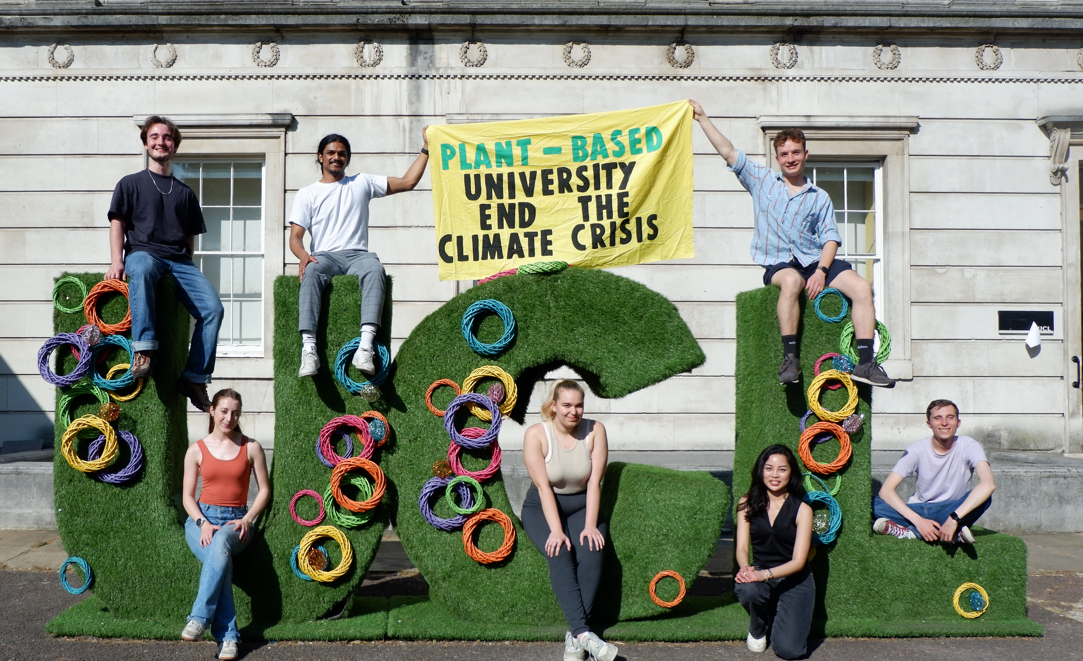
Image credit: Plant Based Universities
Research about the climate crisis has emerged from universities, and this helps educate the public on the serious nature of these issues. Universities that switch to fully plant-based menus set a precedent and lead by example for other institutions on what can be done to combat the climate emergency.
Vegan By Default:
The University of Toronto (U of T, OISE) has a Staff Sustainability Guide whose goals include making vegan, vegetarian, low waste, and Fair Trade meals the default option when catering meetings or events, offering meat options on request only. They are also avoiding the use of single-use plastics.
Defaulting to oat milk helps restaurants and businesses improve their environmental footprint while supporting local oat producers. It also shifts the norm away from cow milk and helps combat the climate crisis caused in part by the dairy industry. Oat milk requires ten times less land than dairy milk, uses 13 times less water, and produces three times fewer greenhouse gas emissions.

What Can Students Do?
Yarim Hinojosa, a student at the University of Toronto and president of the Plant Based Treaty U of T student club, is working with the Plant Based Treaty and campaigning for more vegan options on campus. During sustainability week, Hinojosa organized events to increase visibility, make connections, and start important dialogues with staff and students about plant-based food.
Watch our Veganuary training with Yarim Hinojosa, Uday Singh and Anita Krajnc.
Hinojosa explains, “Students can watch the university webinar on the Plant Based Treaty YouTube channel, organize informational tabling events, food giveaways, film screenings, as well as connect with university faculty, staff and students to watch the documentary Eating Our Way To Extinction.”
In addition to inviting students and staff to screenings, Hinojosa invited five Chefs working at U of T and followed up with them about increasing vegan options. Building a relationship with Chefs is important and allows a collaborative approach while supporting new changes.
What Can University Chefs Do?
Chefs can change menus and play a role in providing climate-friendly, plant-based menus. This includes increasing vegan options if not able to go fully plant-based yet, using plant-based milk by default, introducing healthy vegan specials, and running promotions or discounts on vegan meals to encourage students to try new foods. Sharing vegan guides, recipe cards, and food samples also help raise awareness.
Hinojosa explains that connecting directly with Chefs at U of T was beneficial, and they were empathetic about the climate anxiety of students and eager to create solutions to help mitigate the climate crisis by adding plant-based foods to menus.
“Meeting the university Chefs has been an inspiring & exciting experience. We are so thankful that each chef we met was open to having a constructive, collaborative dialogue with the students and eager to work together to achieve the university’s sustainability goals.”
Hinojosa presented Chefs with the latest scientific data from the Safe and Just report to support switching to vegan meals.
“A great success story is how Chef Nancy Manotas from La Taula Verde cafe at Gerstein Library decided to switch to an entirely vegan menu for the month of January to reduce carbon emissions after speaking with me and our student club.”
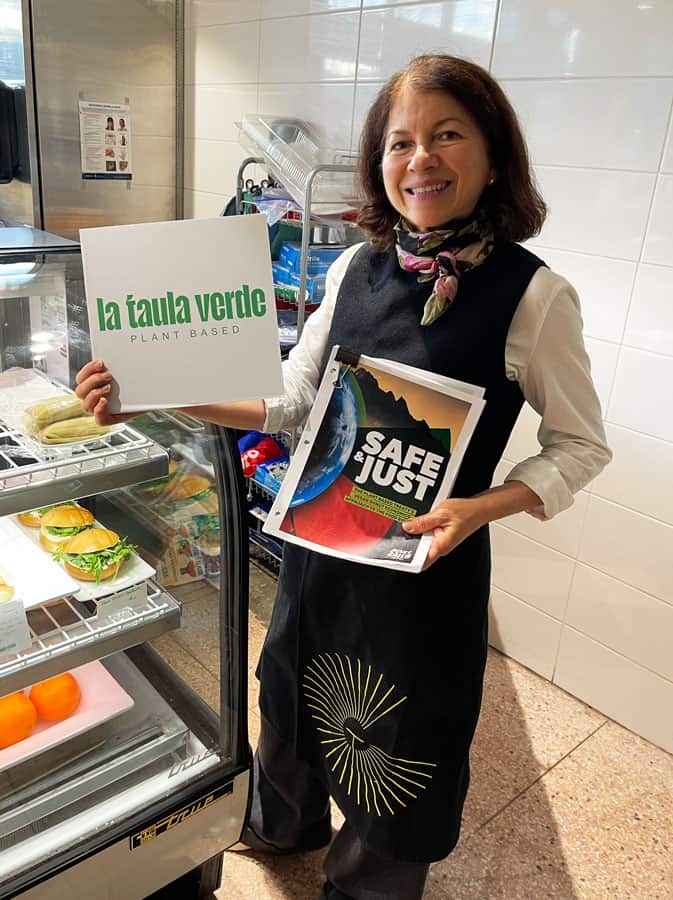
Chef Nancy Manotas at La Taula Verde cafe, which switched to a vegan menu for January.
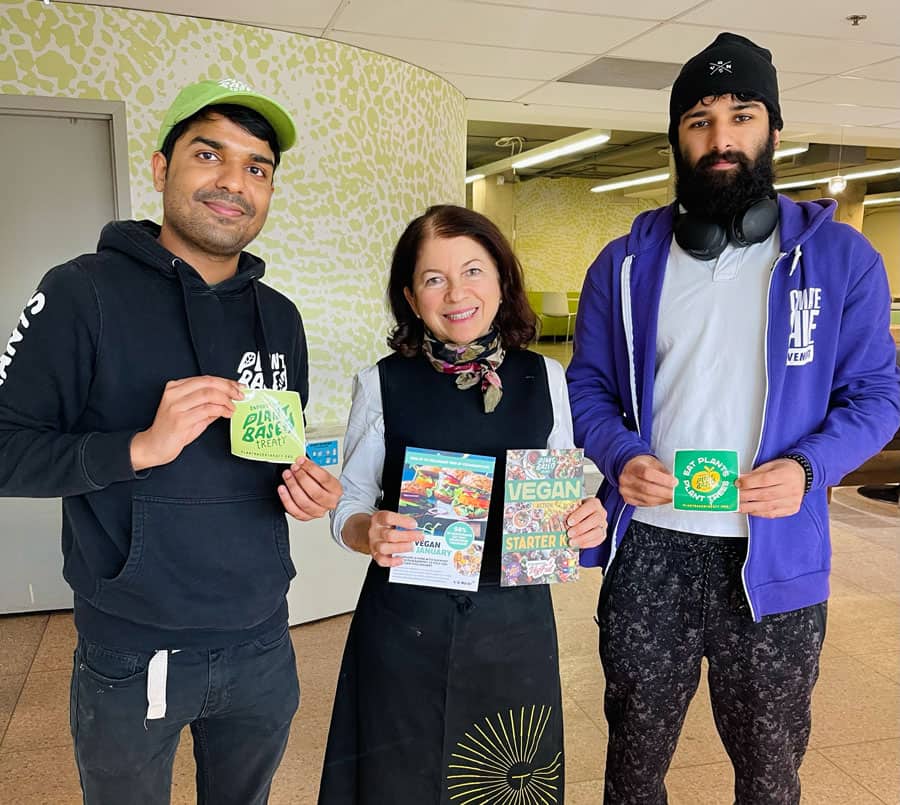
Varun Virlan and Uday Singh speak to Chef Nancy Manotas about Veganuary and Plant Based Treaty.
Chef Manotas is participating in Veganuary because she has studied a lot about longevity foods. “I am very interested in longevity. I think that longevity foods go hand in hand with plant-based foods”, she explains. She prepares delicious food daily, including vegan scones and yogurt cups created with organic ingredients, in addition to hearty entrees and grab-and-go snacks for students on the move.
Beyond Veganuary:
University students around the world can keep the momentum going after Veganuary ends.
“Every month from February until April (Earth Month) our club and collaborators will continue organizing events to help educate students, faculty, staff and Chefs about how plant-based diets contribute to lower greenhouse gas emissions and inspire them to try more plant-based foods on campus”, Hinojosa explains. Additional film screenings, food and drink giveaways, and more tabling events will lead up to their special week-long event in April.
For students wishing to get involved and approach University Chefs, Hinojosa suggests joining the global Plant Based Treaty University campaign to connect with resources and create a Plant Based Club to help transform university menus.
Students can take part in similar campaigns any month of the year as part of the Plant Based Treaty’s “Try Plant Based Month” campaign and use the Universities and Colleges Playbook as a guide.

Miriam Porter is an award-winning writer who writes about veganism, social justice issues, and eco-travel. Miriam currently lives in Toronto with her son Noah and many rescued furry friends. She is a passionate animal rights activist and speaks up for those whose voices cannot be heard.
More from the blog
Ten Plant Based Treaty Celebrity Endorsers Making A Difference
By Miriam Porter
Kickstart Spring With A Nourishing Green Smoothie By Dr. Brooke Goldner
By Miriam Porter
From Global Advocacy To Menu Changes: Plant Based Treaty’s Goals For 2025
By Miriam Porter

